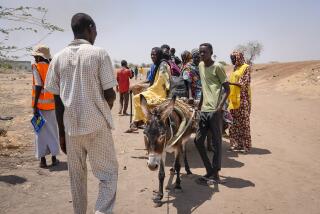Widening Rebel Split May Mean More Strife for Western Sudan
- Share via
NAIROBI, Kenya — Militants seize an entire village in southern Darfur. Armed marauders to the north loot homes and ranches. A group of international observers is kidnapped.
They sound like the same tragic stories that have emerged from western Sudan since 2003. But these latest attacks came not from the reputedly government-backed militias known as janjaweed, but instead from Darfur’s own rebel groups, who many in the restive region have long viewed as freedom fighters battling oppression.
A widening split inside key Darfur rebel groups is emerging as the latest threat to western Sudan, fueling violence and undermining peace talks underway in Abuja, the capital of Nigeria.
“Because of this divide in the rebellion, they are increasingly becoming a major part of the problem, rather than a possibility for the solution,” said John Prendergast, a senior advisor to the International Crisis Group, a conflict-resolution advocacy organization.
U.S. officials are concerned that the rebel split could prolong a conflict that has already killed an estimated 180,000 people and displaced 2 million.
U.S. Deputy Secretary of State Robert B. Zoellick arrives today in Nairobi, the Kenyan capital, to mediate talks among Darfur rebel leaders, pressing them to set aside their differences and respect a cease-fire.
“Darfur rebel groups are fighting amongst themselves,” Zoellick said before departing on a five-day trip to Kenya and Sudan. “Any spark could set off a wildfire, so all of the key parties have important work to do to keep things on track.”
Jendayi E. Frazer, assistant U.S. secretary of State for African affairs, said the resurgence of violence in Darfur stemmed partly from a power struggle among rebel leaders.
“They try to exert themselves on the battlefield ... to improve their position at the negotiating table,” Frazer told reporters Friday. She is accompanying Zoellick on the Africa trip.
“Part of the problem with the Abuja peace process becoming a success is [rebel] unity, and so that’s why the deputy secretary’s mission to Nairobi is so critical,” she said.
One of the key fractures is between two leaders inside the Sudan Liberation Army, the main rebel movement in Darfur. There have also been conflicts between the SLA and a second rebel group, the Justice and Equality Movement.
Many suspect these disputes led to the killing of two African Union peacekeepers and the kidnapping of at least 18 African Union observers in Darfur last month.
The attacks were believed to have been carried out by fringe rebel groups that were angry over being excluded from the peace talks in Abuja. Some SLA leaders oppose participating in the peace talks at all.
Those talks were adjourned last month without much progress. They are scheduled to resume Nov. 21.
“It’s moving slowly,” said Assane Ba, a spokesman for the African Union, which is helping to oversee the talks. “The split inside the rebel movements doesn’t help matters.”
The SLA split is falling largely along tribal lines between the Fur and Zaghawa. Abdel Wahed Mohamed el-Nur, a Fur leader, participated in the last round of peace talks, but his rival, Minni Arko Minnawi, a Zaghawa commander, condemned the talks as illegitimate.
A week ago, SLA rebels attempted to convene a conference in Darfur to elect a new leader. This time, Minnawi showed up and was elected president of the SLA, but Nur boycotted.
Some now fear the SLA could splinter into two distinct movements, further complicating peace talks.
Residents of Darfur have reacted with surprise and disgust. Many have viewed the rebels as heroes for standing up to the Khartoum government and for battling the militias, which have been accused of carrying out genocide in Darfur with support from the government.
“People see the SLA as their rescuers,” said Salih Osman, a human rights activist in Darfur. “They are very much disappointed.”
The feuding at times has led rebel factions to battle one another or launch attacks aimed at flexing their muscles, sometimes catching civilians in the crossfire, Osman said.
In September, SLA rebels raided the South Darfur town of Sheiria, cutting off 33,000 residents from aid and violating a cease-fire agreement. The rebels later relinquished control of the town under international pressure.
Analysts say Khartoum could be the biggest winner from the rebel split, and many see the government’s hand in encouraging the factionalization.
More to Read
Sign up for Essential California
The most important California stories and recommendations in your inbox every morning.
You may occasionally receive promotional content from the Los Angeles Times.













